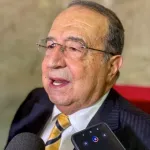By MDT,Renato Marques
Copyright macaudailytimes

The president of the Macau Portuguese School (EPM) Foundation, Jorge Neto Valente, has said that the Portuguese government is open to addressing the school’s problems.
Neto Valente spoke to the media yesterday morning during a meeting with the Portuguese Prime Minister, Luis Montenegro, as part of his visit to the EPM.
He told reporters that the visit is highly significant, as it is uncommon to meet directly and in person with the Portuguese Prime Minister.
“This is very important to us, and we have found openness to the problems we face. Regarding matters under Portugal’s jurisdiction, the Prime Minister has promised his full commitment and to keep the lines of communication open so that we can convey our needs,” Neto Valente said.
“For us, it is an honor, but above all, it is an opportunity to raise awareness of our situation here as a School of Portuguese Language and Culture. Our aim is to establish better relations with the Portuguese government, which is largely responsible for our existence and survival and, above all, for the support it provides – not only in financial terms but also in defining the school’s curriculum and granting special licenses for teachers from Portugal to teach at the Portuguese school under this special license regime,” he added.
Remarking that the issues regarding teachers are currently resolved, Neto Valente noted that the only remaining problem is a local matter concerning the certification of some teachers’ credentials to teach in Macau.
“It’s a local problem because there are differences in how teachers’ credentials and skills are assessed. Here at the school, we are subject to Portuguese legislation, which covers everything, and Macau legislation, which also supports us, so we must comply with local laws. Since the school was created, and under the understanding of the joint liaison group during the transition period, it has been established that the Portuguese school would have administrative, financial, and pedagogical autonomy,” he noted, affirming that the issue is mainly related to the latter.
“For us, what matters most is pedagogical autonomy, because the school has to decide which teachers are competent and qualified to teach the Portuguese curriculum in Macau. The school does not recruit teachers for other international schools or for Macau in general; it only recruits for the EPM. Naturally, the teachers who come from Portugal are better prepared to teach the Portuguese curriculum, which provides access to Portuguese universities, European universities, and universities in Portuguese-speaking countries.”
Neto Valente remarked that many students from Macau can continue their studies abroad, even outside the European Union, thanks to the comprehensive and appropriate curriculum offered by the Portuguese school, noting that pedagogical autonomy should remain the school’s priority.



